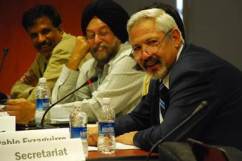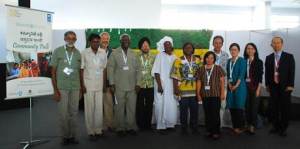COMDEKS Project featured at CBD COP 11 IPSI Side Event
 On 11 October 2012, at the 11th meeting of the Conference of the Parties (COP 11) to the Convention on Biological Diversity (CBD), organized by the CBD Secretariat in Hyderabad (Andhra Pradesh), India; the UNDP implemented COMDEKS was prominently featured at a side event on “Achievements and Further Development of the International Partnership for the Satoyama Initiative (IPSI)”. The side event was organized by the Ministry of Environment of Japan and the IPSI Secretariat (UNU-IAS) attracting the interest of practitioners on how to operationalize the Satoyama Initiative Concept.
On 11 October 2012, at the 11th meeting of the Conference of the Parties (COP 11) to the Convention on Biological Diversity (CBD), organized by the CBD Secretariat in Hyderabad (Andhra Pradesh), India; the UNDP implemented COMDEKS was prominently featured at a side event on “Achievements and Further Development of the International Partnership for the Satoyama Initiative (IPSI)”. The side event was organized by the Ministry of Environment of Japan and the IPSI Secretariat (UNU-IAS) attracting the interest of practitioners on how to operationalize the Satoyama Initiative Concept.
The event, chaired by Prof. Alfred Oteng-Yeboah (Ghana National Biodiversity Committee), aimed to showcase a number of IPSI activities undertaken since the partnership was launched in 2010, and to provide an update on the partnership’s strategy development and a discussion of future plans.
Mr. Kazuaki Hoshino (MOEJ) opened the event congratulating IPSI on its development and emphasized the importance of COP11 as an opportunity for following up on the key outcomes of COP10, held in October 2010 . The keynote was followed by the Director of the IPSI Secretariat, Mr. Kazu Takemoto, presenting an overview of IPSI’s progress in the past two years. Next, Dr. Jo Mulongoy, visiting professor at UNU-IAS, provided an outline of the IPSI strategy development process and its usefulness in measuring progress and mobilizing resources. Finally, two in-depth presentations discussed the COMDEKS initiative and indicators of resilience in SEPLS. Ms. Fumiko Fukuoka (UNDP), provided background information and the latest updates on COMDEKS while Mr. Prabhjot Sodhi (GEF-SGP) provided on-the-ground insights of the COMDEKS programme in India, where more than 100,000 people are currently its beneficiaries. Dr. Pablo Eyzaguirre (Bioversity International) explained the development of the SEPLS indicators of resilience and its utility, stressing the need for further testing and refining of the indicators.
Panel Discussion
Chair: Prof. Alfred Oteng-Yeboah (Ghana National Biodiversity Committee)
1) Overview of IPSI activities since its launch at CBD COP10
Mr. Kazu Takemoto – IPSI Secretariat
2) Introduction of IPSI Strategy
Dr. Jo Mulongoy – United Nations University Institute of Advanced Studies (UNU-IAS)
3) Presentation of IPSI-3 Public Forum Outcomes
Dr. Anil Kumar – M S Swaminathan Research Foundation (MSSRF)
4) “Investing in Community-Based Resilience of Socio-Ecological Production Landscapes and Seascapes”
Ms. Fumiko Fukuoka – United Nations Development Programme (UNDP)
Mr. Prabhjot Sodhi – National Coordinator, GEF-Small Grants Programme, India
5) Indicators of Resilience in Socio-ecological Production Landscapes and Seascapes (TBC)
Dr. Pablo Eyzaguirre – Bioversity International
Community Palli Session: Linking Community and Landscape Resilience
 On 12 October 2012, during the CBD COP 11 in Hyderabad, India, UNDP and the International Partnership for the Satoyama Initiative (IPSI) jointly organized a side event to understand landscape resilience and link the community and social aspects of building and maintaining SEPLS. Speakers from civil society organizations, government institutions, the private sector, and international organizations discussed issues, best practices and lessons learned related to building local institutions and social capital toward more inclusive and participatory decision-making processes at the landscape level. The event, opened by Mr. Wataru Suzuki (IPSI Secretariat), Ms. Fumiko Fukuoka (UNDP), and Prof. Alfred Oteng-Yeboah (Ghana National Biodiversity Committee) brought together a dynamic and inspiring group of partners at the community level. The discussion was facilitated by Dr. Pablo Eyzaguirre (Bioversity International). Please click here for more information
On 12 October 2012, during the CBD COP 11 in Hyderabad, India, UNDP and the International Partnership for the Satoyama Initiative (IPSI) jointly organized a side event to understand landscape resilience and link the community and social aspects of building and maintaining SEPLS. Speakers from civil society organizations, government institutions, the private sector, and international organizations discussed issues, best practices and lessons learned related to building local institutions and social capital toward more inclusive and participatory decision-making processes at the landscape level. The event, opened by Mr. Wataru Suzuki (IPSI Secretariat), Ms. Fumiko Fukuoka (UNDP), and Prof. Alfred Oteng-Yeboah (Ghana National Biodiversity Committee) brought together a dynamic and inspiring group of partners at the community level. The discussion was facilitated by Dr. Pablo Eyzaguirre (Bioversity International). Please click here for more information
The event was opened by Mr. Wataru Suzuki (IPSI Secretariat), Ms. Fumiko Fukuoka (UNDP), and Prof. Alfred oteng-Yeboah (Ghana National Biodiversity Committee. The event brought together a dynamic and inspiring group of partners at the community level, including Ms. Florence Daguitan, Indigenous Peoples’ International Center for Policy Research and Education (TEBTEBBA), Philippines; Ms. Noelie Ouedraogo, Association Songtaab-Yalgré, Burkina Faso; Mr. Prabhjot Sodhi, National Coordinator, GEF-Small Grants Programme, India; Ms. Vore Gana Seck, Green Senegal, Senegal; Mr. Cliff Marlessy, Community-based Marine Management Foundation, Indonesia; Ms. Akane Minohara, United National University Institute for Advanced Studies (UNU-IAS); Mr. Piyasoma Bentota, The Committee for People’s Rights (Podujana Himikam Kamituwa), Sri Lanka.
The Community Palli is a peer-to-peer meeting platform at COP 11 that was open to all local and indigenous leaders from around the world. Leveraging the unique partnerships of the Equator Initiative, the Palli aimed to position local advocacy and knowledge sharing within the larger policy dialogues on poverty reduction and biodiversity conservation. Held alongside the eleventh meeting of the Conference of the Parties (COP 11) to the Convention on Biological Diversity, the Community Palli acted as a forum for discussion of the role of local communities in biodiversity conservation and in achieving the Aichi Targets”.
For more information, please read the press release posted on the Satoyama Initiative website.


